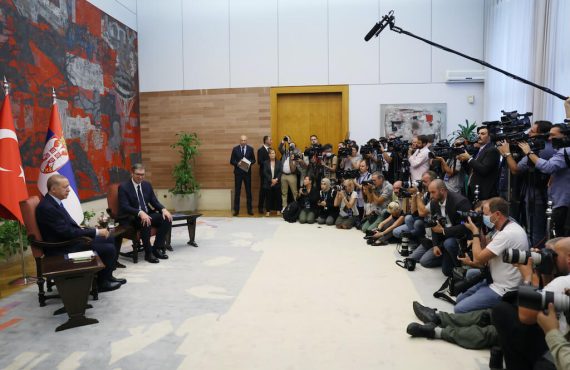T
urkey’s influence in the Balkans needs to be examined in parallel with the question of how Ankara has become a reliable actor in the region. Here, one should point to the cultural and humanitarian diplomacy, which stands out as one of the Justice and Development Party (AK Party) important foreign policy pillars. This doctrine has been at the forefront of the Turkish government’s vision for the Balkans.
In recent political history, Turkey-Balkans relations have been multidimensional and multilayered. While the Balkans have been a politically fragmented and economically fragile region, which was regarded by Europe as “other,” the religious, cultural, and ethnic ties of the region with Turkey, on the other hand, bestowed a unique dimension to Turkey’s relations with the Balkans.
What determines the Western perception of the Balkans is twofold: the Balkans’ overwhelmingly Orthodox Christian population and the long centuries under the rule of the Ottoman Empire. The Balkans have also had varieties of their own internal otherization problems. Dramatic ethnic conflicts took place after the disintegration of Yugoslavia, where Serbs forced the Muslim masses to assimilate through an ethnic genocide policy that resulted in the Bosnia and Kosovo Wars.
Turkey’s approach to the Balkans
The Balkans as a term in Europe largely signifies ethnic conflicts and regional rivalries of great powers. Due to its high geostrategic position, the Balkans fell victim to the great powers’ policies of disintegration and subjugation during the 1990s. Thus, the term “Balkanization” is widely used in English-language International Relations literature to refer to places which are inundated with conflict and instability.
Turkey, contrary to the major powers’ interest-ridden approach to the Balkans, initiated a refined foreign policy based on cultural and historical ties to foster socioeconomic, sociocultural, and eventually political-economic relations. Ankara took proactive steps in cooperation with capitals in the Balkans, and strengthened relations through mutually beneficial economic development projects, increasing trade volume and human capital, and providing educational opportunities.
Turkey’s official Balkan policy rests on the following four principles: high-level political dialogue; security for all; high economic integration; and protection of the region’s multi-ethnic, multicultural, and multireligious social structures.
Turkey is a balancing actor in the Balkans
During President Erdoğan’s visit to Bosnia and Herzegovina, and Montenegro in September 2021, Milorad Dodik, an Orthodox Serbian nationalist and Serbian member of the Bosnia and Herzegovina Presidential Council, said that the countries of the European Union did nothing for Bosnia and Herzegovina, while Erdoğan did, and, for this, he should be accepted as a reliable person for the future of Bosnia and Herzegovina.
On another occasion, in January 2022, Dodik stated that the security and political future of Bosnia and Herzegovina depend on a dialogue of local politicians such as Serbian President Vučić and Croatian President Milanović with the support of Turkish President Erdoğan. Again, in January 2022, Albanian Prime Minister Edi Rama described President Erdoğan as “a person who does what he says and says what he does” both for Albania and regional peace, development, and stability.
This is also indicative of another EU politics impasse. The rising far-right populism in EU countries, the lack of an all-encompassing political will, vision and determination, and leadership issues all narrow Europe’s view of the Balkans. This negative course causes reactions and suspicion towards European politics in the eyes of the Balkan political and bureaucratic elites and societies at large.
Recommended
EU enlargement
All the above are reflected well in recent studies. The Eurobarometer survey, for example, reveals that 52% of the EU population is against enlargement. The rate is 62% in the Netherlands, 58% in France, and 57% in Germany. We can highlight here that France, Denmark, and the Netherlands constantly undermine Albania’s EU membership process.
Albanian PM Rama’s reaction to this situation shows the distrust that lies therein. Rama stated, “Albania will not cry at the door of Europe.” Likewise, the sense of distrust and disunity in Europe during the global pandemic is perhaps best encapsulated in Serbian President Vučić’s words: “European solidarity is a fairy tale.”
In comparison to the grey picture of Europe-Balkans relations, recent public opinion polls in the Balkans indicate a rising interest in Turkey. According to a study by the European Council on Foreign Relations in August 2021, for Serbia, Turkey is the third country to be trusted after Russia and China. The cooperation and trust relationship that Turkey has developed with Balkan countries by resting on its soft power in the last twenty years is of key importance.
The Turkish Cooperation and Coordination Agency (TIKA), the Presidency for Turks Abroad and Related Communities (YTB), the Yunus Emre Institute, the Maarif Foundation, the Turkish Red Crescent, the Turkish Religious Foundation, and various NGOs and international higher education institutions have played major roles in this.
Turkey as a trusted actor in the Balkans
So, how did Turkey achieve mutual trust? TRT World analyst Dilek Kütük explains the reasons:
First, Turkey does not impose any view on any internal or regional tensions rising in the Balkans; instead, Turkey unconditionally offers help and support to all parties.
Second, Turkey applies the principle of “inclusiveness” in its foreign policy. This is evidenced, among others, in the support Turkey gave Kosovo; the diplomatic-political space it opened to North Macedonia; the establishment and operation of the Turkey-Bosnia-Serbia and Turkey-Bosnia-Croatia tripartite mechanisms during Turkey’s presidency of the South East European Cooperation Process; the active stance and multidimensional diplomacy of Ankara to eliminate negative developments that reemerged in Bosnia in 2021; and the balancing position it plays in the tension between Albania-Kosovo and Serbia. In regional or interstate conflict resolution processes, Turkey tries to develop a policy based on constructive engagement.
Third, Turkey does not try to dominate the bilateral processes. Instead, it carries out a win-win policy in the sectors of infrastructure, energy, transportation, defense industry, banking, and, especially, in trade.
Last, Turkey does not approach the Balkan region only through identity and religion. Instead, it adopts an approach towards the preservation of multicultural, multi-ethnic, and multireligious social structures in the Balkans.





